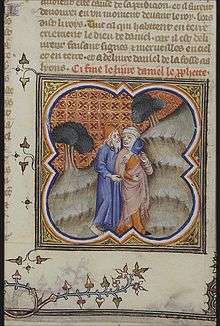Gomer (wife of Hosea)
Gomer (go'-mer) was the wife of the prophet Hosea (8th century BC), mentioned in the Hebrew Bible's Book of Hosea (1:3). Hosea 1:2 refers to her alternatively as a "promiscuous woman" (NIV), a "harlot" (NASB), and a "whore" (KJV) but Hosea is told to marry her according to Divine appointment. She is also described as the daughter of Diblaim.

Children
Hosea 1 relates how Hosea has three children, a son called Jezreel, a daughter Lo-Ruhamah and another son Lo-Ammi. All the names are described in the text as having symbolic meaning, reflecting the relationship between God and Israel. Jezreel is named after the valley of that name. Lo-Ruhamah is named to denote the ruined condition of the kingdom of Israel and Lo-Ammi is named in token of God's rejection of his people.[1][2] Although the latter two children are not specifically said to be Hosea's, James Mays says that this is "hardly an implication" of Gomer's adultery.[3] In Hosea 3:1, however, it says that she is "loved by another man and is an adulteress" (NIV). Hosea is told to buy her back, and he does so for 15 shekels and a quantity of barley.
According to Kirsten Abbott, feminist interpretation regards the story of Hosea and his relations with his wife Gomer as a metaphor for the conflict between a Covenant Theology (Israel violating the covenant relationship with YHWH) and a Creation Theology (YHWH will undo the fertility of the earth in response to Israel following other fertility gods).[4]
Cultural references
- Brooke Fraser has a song called "Hosea's Wife" in her album Albertine.
- Third Day has a song called "Gomer's Theme" on their album Conspiracy No. 5, which is the source of their fans calling themselves "Gomers."
- Francine Rivers' 1991 novel Redeeming Love tells the story of a prostitute named Angel in the 1850s American West, based on the story of Gomer.
- Michael Card has a song called "Song Of Gomer" on his album The Word.
- Estonian writer Ain Kalmus' 1950 novel Prophet tells the tragic love story of Gomer and Hosea.
- (Mesu Andrews') 2013 novel "(Love In A Broken Vessel)" features Gomer as a main character as well as her marriage to Hosea.
- Robert DeLong references "Hosea married Gomer..." in his song Mud in My Eyes
- Bob Dylan's "Key West (Philosopher Pirate)" from Rough and Rowdy Ways seems to allude to the marriage of Hosea and Gomer: "Twelve years old, they put me in a suit /Forced me to marry a prostitute /There were gold fringes on her wedding dress."
References
- Hosea 1
- "www.Bibler.org - Dictionary - Gomer". 2012-09-01.
- Mays, James L. (1969). Hosea. SCM. p. 28.
- "Kirsten Abbott "Creation Motifs in Hosea", Sea Changes Journal, December 2005". Archived from the original on 2008-12-10. Retrieved 2010-10-30.